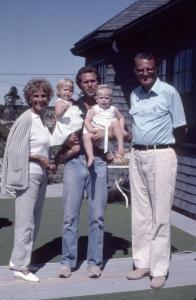At this fleeting moment of civil (in two senses of the word) religion while Americans mourn and mark the death of President George H. W. Bush, the bitterness politics has had a brief pause. That alone is good reason for the pageantry.
The first President Bush was the first candidate I voted for, back in 1992, the first of many times my preferred candidate did not win the Oval Office. I cannot remember why I voted for him, though I did feel a kinship with a president who loathed broccoli as much as I did then.
By the time the second Bush took office, I was old enough to figure out some of the differences between the two presidents. One of the most significant remains their very different relationships with the evangelical Right.

The first president Bush had a religion problem. Ronald Reagan figured out how to talk like an evangelical during his unsuccessful 1976 bid for the Republican nomination, partly by talking with evangelicals and partly by watching Jimmy Carter talk as one. Reagan also belonged to Donn Moomaw’s Bel Air Presbyterian Church. Moomaw came to faith through the ministries of Bill Bright and Henrietta Mears, so Reagan clearly had a certain comfort levels with evangelicals even before his presidential bids. In 1980, Reagan managed to attract many evangelicals who had voted for Carter in 1976. He was for school prayer, against abortion, and — just as important in 1980 — resolute against communism. Partly because Reagan won the support of evangelicals so easily he did not appear beholden to them.
George H. W. Bush knew evangelicals as well. Billy Graham, of course, was a friend of the Bushes, but the Bushes’ Episcopal faith was of the more staid variety. They believed in Christian charity, duty, and tolerance, without the sentimentalism, brashness, and missionary fervor of evangelicalism. Many commentators in the wake of Bush’s death have noted his “quiet faith.” As Stephen Mansfield explains:
Religion was a personal thing. It formed a mandate, yes, but secretly, sounding in a whisper from private places in the soul. It was embarrassing to speak of it publicly.
Both Carter and Reagan had made faith a public thing. It was not possible for Republican candidates going forward to keep in a private thing. Bush absolutely floundered with this. Again per Mansfield, Bush did not have a straight answer prepared when asked whether or not he had had a born-again experience of faith.
In 1987 and early 1988, conservative evangelicals were not desperate the way they were in 2016. Ronald Reagan had lent them a taste of political influence, and they wanted more. In particular, Reagan had mostly ignored their agenda once he took office. Between that and his own difficulty appealing to evangelicals, Bush made himself ripe for a challenge.
That challenge came in the improbable form of evangelical television personality Pat Robertson, who beat the sitting vice president in the 1988 Iowa caucuses. One should read that sentence again. A vice president following a very popular president, blessed with a strong economy and positive developments around the world, should not lose any kind of vote to Pat Robertson. (I had forgotten until looking it up that Robertson won the Washington caucuses that year). Bush worked much harder to secure and retain evangelical support going forward, but in so doing, he alienated many other voters, especially at the 1992 GOP convention.
The younger Bush did not have an evangelical problem. He was an evangelical Christian. Early during the 2000 campaign when he was asked to identify a favorite philosopher or thinker, Bush named “Christ … because he changed my life.” Bush’s foremost challenger, John McCain, had a frosty relationship with conservative evangelical leaders. Bush also benefited from the fact that by 2000, voting for Republican candidates had become far more habitual for many evangelicals. As the 2004 Frontline documentary on Bush’s face suggested, the younger Bush realized that if he could win a high enough percentage of evangelical votes, he would be very formidable in a general election.
In significant ways, the George W. Bush was a bridge between his father and the current Republican Party. The Republican share of the evangelical vote has not risen every election, but the trend line since at least 1976 is very clear.
On this blog and elsewhere, there has been no shortage of commentary on the relationship between Trump and American evangelicalism. It is not at all surprising that Donald Trump captured a massive percentage of the evangelical. Among tribes of American voters, habitual political affiliation matters far more than individual personalities. What’s the ceiling for a Republican nominee among African American voters? 12 percent? The ceiling for a Democratic nominee among evangelicals is probably 25 percent. Given the trajectory of the two parties, that ceiling will probably shrink in the coming years.
One also has to credit President Trump’s political instincts when it came to evangelicals. Given the eventual outcome, it is easy to forget that large numbers of evangelical leaders preferred other candidates or simply disdained Trump. Nevertheless, Trump realized that he could not win the presidency without massive support for evangelicals, so he did not take evangelical support for granted. He clearly had some visceral sense of the above history. In order to win evangelical support, moreover, he did not try to pass himself off as an evangelical. This was extremely wise. Instead, he utilized widespread evangelical dislike for social liberalism in general and Hillary Clinton in particular and offered evangelicals a simple quid pro quo. In exchange for their votes, he would appoint Supreme Court justices acceptable to them. One must say that Trump has kept his end of the deal. Eight years after the end of the Bush presidency, many evangelicals were desperate for a win.













